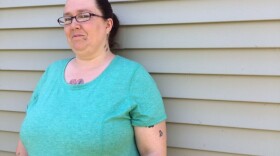Social assistance programs that serve the poor are targeted for budget cuts in President Trump’s proposed budget.
While Congress approaches its fall deadline to set a federal budget for the next fiscal year, Stateside set out to talk with people whose voice isn’t often a part of the conversation: people who are struggling to live paycheck to paycheck, the so-called “working poor”.
Ethel Rucker is from Detroit. She has four kids, two girls and two boys. She's struggled to make ends meet since divorcing her husband.
She says after the split, she tried getting back on her feet. She found a job and started working again. But her children ran into problems at school. As a single mother, all the responsibility fell on her.
“I repeatedly have to step aside to get on the phone to talk with teachers, or other things would happen,” Rucker said. “I would end up either losing a job or getting in trouble because of that, and that’s ultimately what led me to being in the shelter.”
Frustrated with being unable to find a well-paying job even after earning a certificate in computer repair, Rucker wasn’t able to pay the bills needed to keep a roof over her children's heads. She eventually found her way to COTS, a homeless shelter in Detroit.
“I felt that as a mother I was supposed to provide for my children. Not being able to do that, and having to go into the shelter was really hard for me,” Rucker said. “It was one of the hardest decisions I made.”
But at COTS, Rucker found support. She got a life coach through the shelter's Passport to Self-Sufficiency program as well as a mentor through a project focused on improving the lives of women and children living in poverty at COTS. Rucker is also a photographer and has a campaign to raise money for that business through HandUp.
In 2015, Rucker left the homeless shelter. She found a house for her family that she’s able to afford. Rucker says the past few years has been the most stable living conditions her and her children have ever had.
In the long term, Rucker wants to earn her college degree, get her kids into good schools, and become totally independent from state aid.
“Even though I have stable housing right now, it’s still a challenge with my children and their schools. I have two boys who are ADHD, so I still have challenges with their teachers calling me, … and that can ultimately affect my employment because I’m single, so I have to take care of those things,” Rucker said. “I’m hoping, praying that in the next five years [a college degree] will be something I’m able to accomplish, but I’m working hard towards that.”
Rucker says she’s feeling more positive about her life now, thanks to the support she’s received through contacts at COTS.
“This is the most stable I’ve been, these past two years, and I look forward to the future now because I have this extra support,” Rucker said.
Listen to the full interview above.
(Subscribe to the Stateside podcast on iTunes, Google Play, or with this RSS link)





